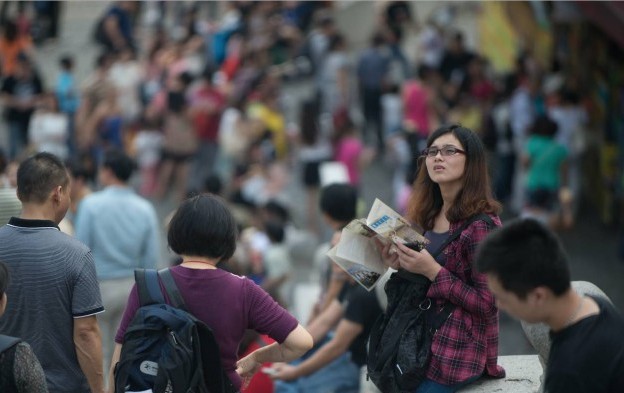Lower-tier China cities to aid Macau casino biz: MS
Jan 16, 2018 Newsdesk Latest News, Macau, Top of the deck

The Macau casino market is likely to benefit in coming years from China’s lower-tier cities becoming wealthier and their citizens becoming more eager to travel and engage in discretionary consumer spending.
So says a research report issued on Monday from investment bank Morgan Stanley, citing proprietary research and publicly-available information.
“Chinese visitors represented 66 percent of total visitors to Macau in 2016, and half of this number came from Shanghai, Beijing and Guangdong province,” stated the authors.
“We estimate more than half of the 20 million Chinese visitor arrivals in Macau in 2016 came from lower-tier cities. This will be further supported by improving transportation infrastructure, increasing hotel room supply, and growing outbound tourism from China,” they added.
Beijing and Shanghai are considered by industry observers as “tier-one” cities in China judged by factors including economic development, local gross domestic product, advanced transportation systems and infrastructure, as well as for historical and cultural significance. An example of what is said to be a leading “tier two” city is Chongqing in southwest China; like Beijing and Shanghai, a direct-controlled municipality in its own right.
Morgan Stanley said in its latest report that while in 2016 the market penetration for Macau’s casino industry in neighbouring Guangdong province was 11.9 percent, the ratio for Shanghai was only 2.4 percent, and that for Beijing, 1.7 percent. The bank cited as basis for the analysis data from Macau’s Statistics and Census Service, information from CEIC Data Ltd, and proprietary research.
Market penetration was defined in the research paper as the ratio of visitors from any given target market to the population of that feeder market.
For a tier-two city such as Chongqing, the market penetration rate was even lower, at 1.2 percent, while that for the central western Chinese province of Shaanxi – home to mostly lower-tier cities – was only 0.8 percent, according to the report.
“We see wealthier lower-tier cities narrowing the gap of per capita disposable income for urban households with tier-one cities by almost 9 percent by 2030 due to infrastructure development, improved transport networks, favourable government policy and technology spillover,” said Morgan Stanley.
“Average income in lower-tier cities was US$4,482 in 2016 and we estimate it will rise to US$10,388 in 2030,” added the bank.
Research from brokerage Sanford C. Bernstein and Co LLC published in October, suggested the average Chinese customer at a Macau casino was aged 36, in likelihood male, and very likely lived in one of China’s most economically developed cities, earning CNY19,000 (US$2,900) per month, and had visited Macau three times in the previous 12 months.
Morgan Stanley noted in its Monday report that it expected Macau 2018 gross gaming revenue to expand by 16 percent year-on-year, driven by VIP growth of 20 percent and mass growth of 12 percent.
Related articles
-
 Melco to get 50pct casino EBITDA at Sri...
Melco to get 50pct casino EBITDA at Sri...Jul 10, 2024
-
 Macau suspects in US$134mln...
Macau suspects in US$134mln...Jul 02, 2024
More news
-
 Donaco EBITDA up y-o-y to above US$4mln...
Donaco EBITDA up y-o-y to above US$4mln...Jul 26, 2024
-
 HK listed Palasino upgrades Czech...
HK listed Palasino upgrades Czech...Jul 26, 2024
Latest News
Jul 26, 2024
Border-casino operator Donaco International Ltd has achieved a 164.17-percent year-on-year increase in its latest quarterly group earnings before interest, taxation, depreciation and amortisation...Sign up to our FREE Newsletter
 (Click here for more)
(Click here for more)
Pick of the Day
”We’ve got more traction outside of Macau at the moment. But Macau’s going be a bigger focus for us”
David Punter
Regional representative at Konami Australia
Most Popular
 Sheraton brand to exit Londoner Macao, to be Londoner Grand July 25, 2024
Sheraton brand to exit Londoner Macao, to be Londoner Grand July 25, 2024  Macau regulator probes unlicensed gaming agents July 24, 2024
Macau regulator probes unlicensed gaming agents July 24, 2024  Philippines gives 20k aliens in POGOs 60 days to leave July 25, 2024
Philippines gives 20k aliens in POGOs 60 days to leave July 25, 2024  Philippines-listed DigiPlus says not affected by POGO ban July 24, 2024
Philippines-listed DigiPlus says not affected by POGO ban July 24, 2024  Sands China 2Q EBITDA down q-o-q amid low hold, renovation July 25, 2024
Sands China 2Q EBITDA down q-o-q amid low hold, renovation July 25, 2024






